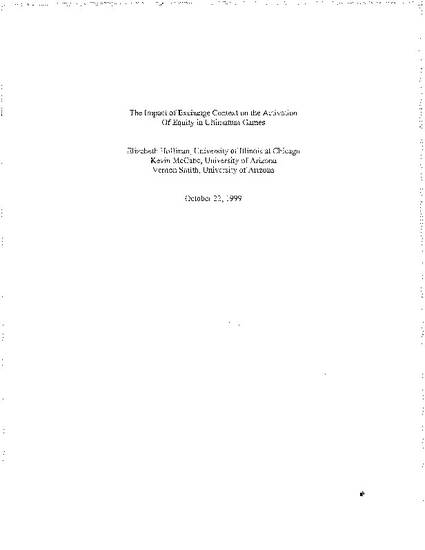
Article
The Impact of Exchange Context on the Activation of Equity in Ultimatum Games
Experimental Economics
(2000)
Abstract
In this paper we report the results of additional exchange ultimatum game experiments conducted at the same time as the exchange ultimatum game experiments reported in Hoffman et al. (Games and Economic Behavior, 7(3), pp. 346–380, 1994). In these additional experiments, we use instructions to change an impersonal exchange situation to a personal exchange situation. To do this, we prompt sellers to consider what choices their buyers will make. Game theory would predict that thinking about the situation would lead sellers to make smaller offers to buyers. In contrast, we find a significant increase in seller offers to buyers. This result suggests that encouraging sellers to thinking about buyer choices focuses their attention on the strategic interaction with humans who think they way they do in personal exchange situations, and who may punish them for unacceptable behavior, and not on the logic of the game theoretic structure of the problem.
Disciplines
Publication Date
June, 2000
DOI
10.1023/A:1009925123187
Publisher Statement
This article is published as Hoffman, E., McCabe, K. & Smith, V. The Impact of Exchange Context on the Activation of Equity in Ultimatum Games. Experimental Economics 3, 5–9 (2000). doi: 10.1023/A:1009925123187. Copyright 2000 Economic Science Association. Posted with permission.
Citation Information
Elizabeth Hoffman, Kevin McCabe and Vernon Smith. "The Impact of Exchange Context on the Activation of Equity in Ultimatum Games" Experimental Economics Vol. 3 (2000) p. 5 - 9 Available at: http://works.bepress.com/elizabeth-hoffman/34/
